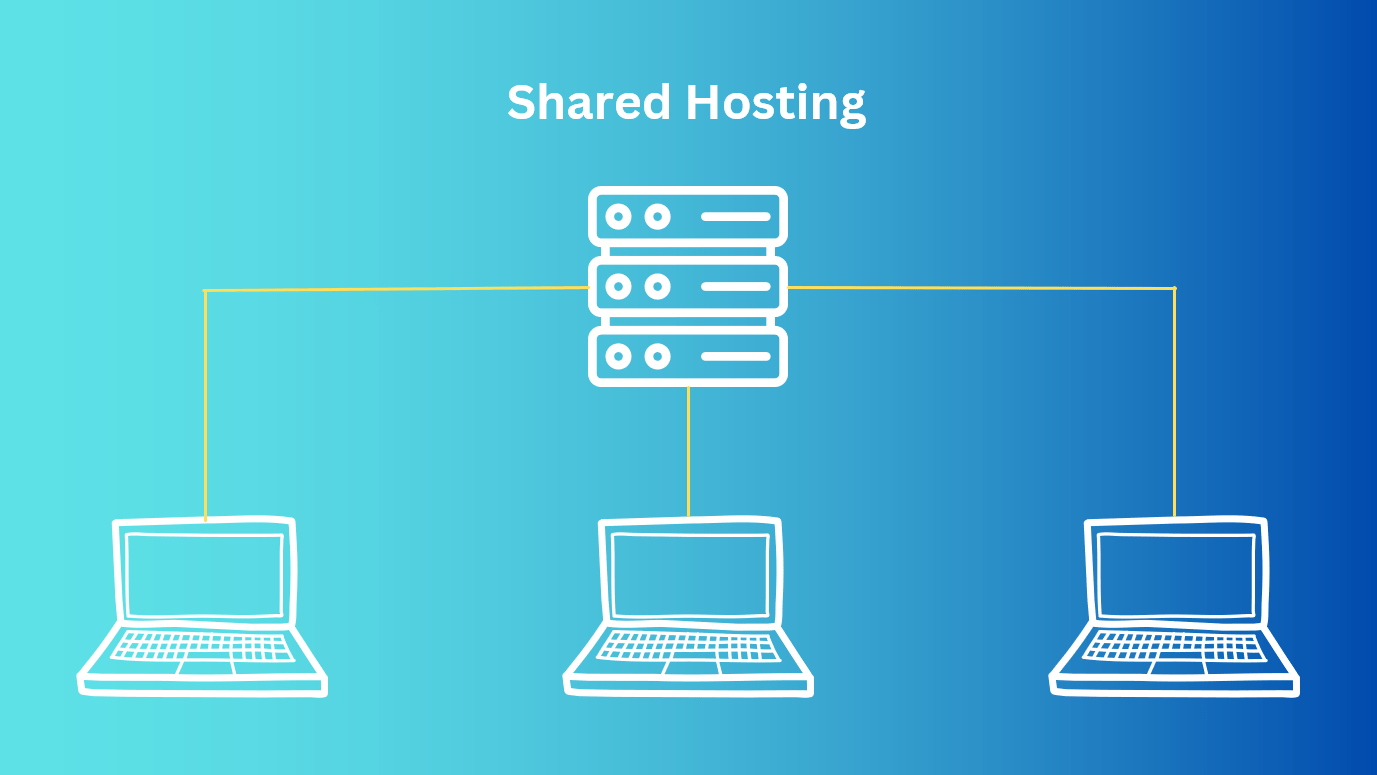What is Shared Hosting ?
Shared hosting is an economical web hosting solution where multiple websites are hosted on a single physical server, sharing its resources such as CPU, memory, and disk space. Each website owner is allocated a portion of the server’s resources based on their hosting package. While cost-effective, this arrangement comes with significant limitations and risks that can adversely affect your online business.
The Downside of Shared Hosting for Your Business
- Security Vulnerabilities
- The “Neighbor Effect”: A compromised website on a shared server can pose a risk to others due to shared vulnerabilities, allowing attackers to exploit one site to access others.
- Resource Contention: Shared resources mean your site could suffer from performance issues if another site on the server is targeted by a DDoS attack or experiences unexpected traffic spikes.
- Limited Control Over Security: Users have little to no control over the server’s security settings, relying entirely on the hosting provider’s security measures, which may not always be stringent.
- Outdated Software: There’s a risk of hosting providers not promptly updating software, leaving sites vulnerable to security breaches.
- Cross-Site Contamination: A malware-infected site can spread the infection to other sites on the server, especially if isolation measures are inadequate.
- Shared IP Complications: A shared IP address means that if one site engages in malicious activity, it could lead to the IP being blacklisted, impacting all sites hosted under it.
- Performance and Reliability Issues
- Resource Limits: The shared nature of the hosting environment means that resources are finite and can be quickly depleted by a few resource-heavy websites, leading to slowdowns for others.
- Inconsistent Performance: Your website’s performance can fluctuate based on the activities of other websites on the same server, leading to potential downtime or slow loading times.
- Overselling: Some hosts may oversell the server’s capacity, exacerbating performance issues and leading to a poor user experience.
- SEO and Visibility Concerns
- Speed Impacts: Search engines, like Google, use site speed as a ranking factor. Shared hosting can lead to slower page load times, negatively affecting your site’s SEO performance.
- IP Reputation: Sharing an IP with spam or malicious websites can harm your site’s reputation, potentially leading to lower search rankings or even blacklisting by search engines.
- Data Integrity and Loss Risks
- Shared Infrastructure Risks: The lack of isolation in a shared environment increases the risk of data breaches or loss due to a single point of failure.
- Backup and Recovery Limitations: Relying on the hosting provider’s backup solutions means you may not have a personalized backup strategy, increasing the risk of data loss without a viable recovery option.
The Positive Side of Shared Hosting
While the discussion around shared hosting often highlights its limitations and potential risks, it’s important to recognize the valuable role shared hosting plays in the web hosting ecosystem, especially for certain users and scenarios. Shared hosting isn’t just a stepping stone in web hosting; it’s a perfectly viable solution for many, thanks to its affordability, simplicity, and adequacy for a variety of web projects.
Affordability: Its Cheap !
Ease of Use: For those without technical expertise or a dedicated IT team, shared hosting provides a user-friendly platform to launch and manage websites.
Built-in Features and Tools: Shared hosting plans often come with a suite of built-in tools and features designed to help non-tech users create, simple sites and go online in minutes.
Community and Support: Shared hosting providers typically offer 3rd party controls like cPanel which has extensive support through documentation, forums and community of users who can share advice, solutions, and experiences..
Solutions and Alternatives
To overcome the limitations and risks associated with shared hosting, several alternatives offer varying balances between cost, performance, and control. Here’s a detailed look at each:
Virtual Private Server (VPS) Hosting
A Virtual Private Server (VPS) provides a dedicated portion of a server’s resources, such as CPU, RAM, and storage, through virtualization technology. It’s a middle ground between shared hosting and having a dedicated server.
- Pros:
- Cost-Effective: More affordable than dedicated hosting while offering significantly better resources and control than shared hosting.
- Scalable: Easily scale resources up or down as needed without the need for physical hardware changes.
- Customizable: Full root access allows for custom software or configuration changes.
- Isolation: Your environment is isolated from other users, enhancing security and performance.
- Cons:
- Resource Limits: While resources are dedicated, they are still limited by the physical server’s capacity.
- Management: Requires more technical knowledge to manage and secure than shared hosting.
Virtual Dedicated Server (VDS) Hosting
Virtual Dedicated Server (VDS) hosting offers virtualized servers with resources that are not shared with other customers. It provides greater control and customization than VPS.
- Pros:
- Dedicated Resources: Guarantees resources that are not affected by other users’ activities.
- High Performance: Offers high performance and reliability for demanding websites and applications.
- Scalability: Resources can be adjusted based on your needs, providing flexibility.
- Security: Enhanced security features due to isolation from other servers.
- Cons:
- Cost: More expensive than VPS hosting due to the dedicated resources.
- Technical Expertise: Requires a good level of technical knowledge to manage and optimize.
- Cloud Hosting: Delivers scalability and reliability, with resources distributed across multiple servers in the cloud.
- Dedicated Server Hosting: The most robust option, offering exclusive access to all the resources of a single server.
Cloud Hosting
Cloud hosting uses a network of virtual servers that pull from underlying physical servers’ resources. It’s known for its scalability and reliability.
- Pros:
- Scalability: Can quickly adjust resources to meet demand spikes.
- Reliability: If one server fails, others in the network can take over, minimizing downtime.
- Pay-As-You-Go: You pay only for the resources you use, which can help manage costs.
- Performance: Often includes built-in optimizations for speed and efficiency.
- Cons:
- Complexity: Can be complex to set up and manage, particularly for those without technical expertise.
- Variable Costs: While it can be cost-effective, unexpected spikes in traffic can increase costs quickly.
Dedicated Server Hosting
With dedicated server hosting, you rent an entire server. This option offers the highest level of resources, control, and performance.
- Pros:
- Exclusive Resources: All the server’s resources are dedicated to your website or application.
- Performance and Reliability: Maximum performance without neighboring sites affecting your resources.
- Control and Customization: Full root access for complete control over the server environment.
- Security: Can implement custom security measures tailored to your specific needs.
- Cons:
- Cost: Significantly more expensive than other hosting options due to the exclusive resources and benefits.
- Management: Requires technical expertise or additional investment in managed services to maintain and secure the server.
Each of these hosting solutions offers a unique set of benefits and considerations. The choice between them depends on your website’s needs, your budget, and your technical capability. For businesses outgrowing shared hosting, evaluating these options in the context of current and future needs of you businesses can help you in making an informed decision that supports growth and performance objectives.
Conclusion
While shared hosting might seem attractive due to its low cost, the potential risks to security, performance, and SEO can far outweigh the initial savings, especially for businesses dependent on their online presence. Upgrading to a more reliable hosting solution like VPS, cloud, or dedicated hosting can safeguard your website from these risks, ensuring better performance, security, and growth potential for your online business. Consulting with a managed service provider can also offer personalized guidance and management, freeing you to focus on strategic business objectives rather than IT infrastructure concerns.




